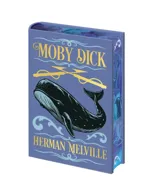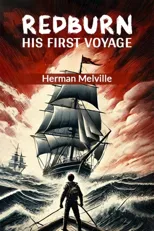Ishmael, a sailor, finds his way onto a whaling vessel, one that is captained by Ahab, a stubborn man on a quest to destroy the whale that 'took' his leg in a battle. Despite a highly credible prophesy and evidence that any pursuit of Moby Dick will end in death, Ahab becomes fanatical about getting revenge. Crew members fall ill and turn mad, but nothing incites doubt in the mind of the captain. Moby Dickis a phenomenal depiction of the test of faith. It asks the reader whether some things are just too big to be fathomed, too powerful to be conquered by any act.
Herman Melville
Herman Melville (1819-1891) was an American novelist, poet, and short story writer best known for his novel "Moby-Dick," a complex and symbolic work that explores themes of obsession, fate, and the struggle between good and evil. Melville's writing style is characterized by its rich symbolism, philosophical depth, and exploration of existential themes. His other notable works include "Typee," "Billy Budd," and "Bartleby, the Scrivener." Melville's contributions to literature have had a lasting impact on the development of American literature, particularly in the genre of the novel.






